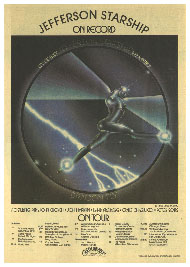![]()
  |

Dragon Fly
Jefferson Starship
RCA BFL1-0717
Released: October 1974
Chart Peak: #11
Weeks Charted: 37
Certified Gold: 2/19/75

 For several years, the nucleus of the Airplane/Starship has been struggling to hold together a concept that didn't seem workable in the first place. The performing personalities of Slick and Kantner have long seemed much too cold-hearted to deal convincingly with humanistic themes. Their key remoteness has combined with Kantner's pedantry and Slick's sarcasm to turn the pair into unknowing self-parodies.
For several years, the nucleus of the Airplane/Starship has been struggling to hold together a concept that didn't seem workable in the first place. The performing personalities of Slick and Kantner have long seemed much too cold-hearted to deal convincingly with humanistic themes. Their key remoteness has combined with Kantner's pedantry and Slick's sarcasm to turn the pair into unknowing self-parodies.
But this is better: Dragon Fly is at worst listenable and at best surprisingly engaging. New guitarist Craig Chaquico makes up in ebullience what he lacks in subtlety, Pete Sears (on bass and keyboards) is a pro, and the leading couple sounds almost excited at times.
 Click image for larger view. |
- Bud Scoppa, Rolling Stone, 1/2/75.
Bonus Reviews!Taking the Starship, Jefferson-wise, is a more clinical, plastic way to go than taking the Airplane was. One lesson in that, I suppose, is that the less primitive travel becomes, the less romantic it becomes. This is an example of a good band without much style, and it must surely set some kind of record in the how-far-from-synergy-can-you-get category. The whole equals so much less than the sum of the parts that you wonder if it had outside help. It seems rigged, somehow, and perhaps it is rigged to a degree by a rebellion in us listeners against putting up with two-minute stretches without a chord change. Being objective about it, you'd have to say Paul Kantner's songwriting hasn't gotten any worse -- it was always this lousy and sometimes lousier -- and this album, partly for that reason, isn't any worse off melodically than several in the past. To get away with it, you must have style, and I guess Jorma Kaukonen's Airplane lead guitar and Jack Casady's Airplane bass has it all over Craig Chaquico's Starship lead and Pete Sears' Starship bass, style-wise Chaquico plays a good lead, but he's so smooth he can't be readily identified with any particular group or style. Grace Slick's vocals and Papa John Creach's fiddle are the main attractions, but both seem increasingly restricted by the pounding format and the awkward writing "Hyperdrive" suggests how good a Starship album could be if everything went right, staring with the script (this one by Sears and Slick), but much in this album suggests it's going to take more than simply trying hard. Little tidbits of inspiration have to coagulate for a band like this, as happened in a couple of terrific cuts in Kantner and Slick's Sunfighter album. Marty Balin's appearance here adds several points in the distance-from-synergy column; he's really a stylish singer, and the lyrics he wrote for his one song, "Caroline," are wordy but perceptive, though the song is completely wrecked by the inane melody Kantner put on it. The Starship's fuel problem is as least as bad as yours and mine.
- Noel Coppage, Stereo Review, 2/75.
The finest effort from Slick, Kantner, Freiberg, Creach, Balm and company in a long time, with several superb rock cuts in the best tradition of the Jefferson Airplane and some equally well done ballads. Ms. Slick has not sounded as powerful on her vocals in a long while, the harmonies will bring back memories of the 1960's and Papa John Creach's violin contributes substantially to each cut without intruding. A superb LP which should put this fine band right back into the mainstream of the rock world. Best cuts: "Ride The Tiger," "Be Young You," "Caroline," "Devil's Den," "All Fly Away."
- Billboard, 1975.
The key cut here is Grace Slick's gnomic "Hyperdrive," in which supertechnology (spirit-powered, perhaps?) cuts through "corners in time." If in 1973 you'd been responsible for Baron von Tollbooth and the Chrome Nun (Jefferson Jitney), Thirty Seconds Over Winterland (dead live), and Bodacious D. F. (Marty's party), you'd want to think you'd turned a corner in 1974 yourself. But though this does achieve a slick modernization of their polyvocal sound (Barbata-powered, definitely), with Papa John Creach's fiddle and Craig Chaquico's guitar synthesizing past and future for purposes of metaphor and stage presentation as Marty Balin's cameo contribution links them audibly to their own history, it also proves that you can't get along forever on generalized imprecations against the powerful and invidious oriental-occidental comparisons. C+
- Robert Christgau, Christgau's Record Guide, 1981.
![]() Reader's Comments
Reader's Comments
No comments so far, be the first to comment.
